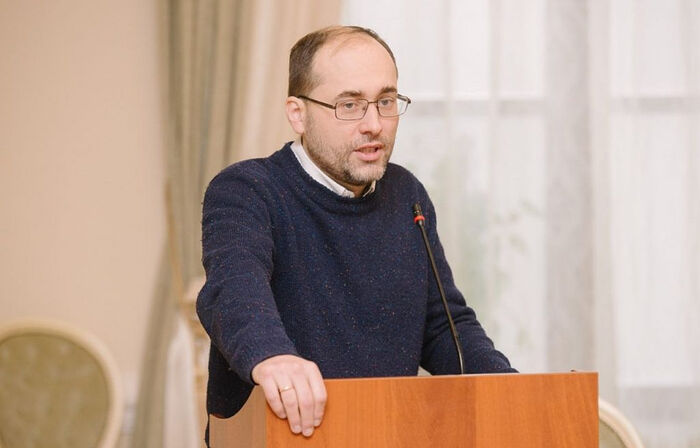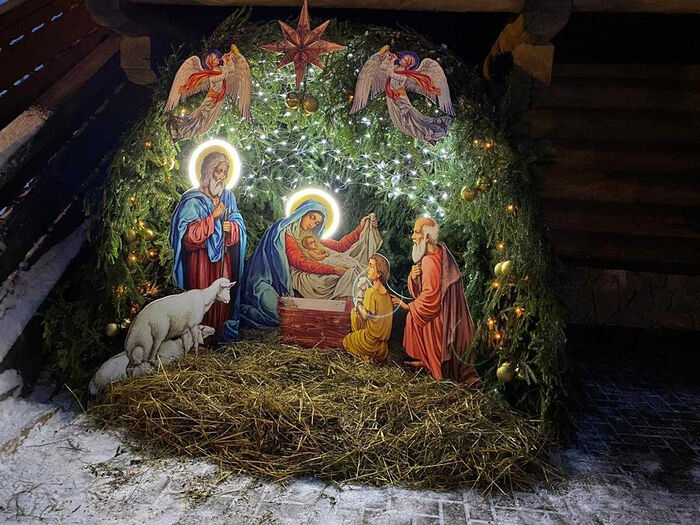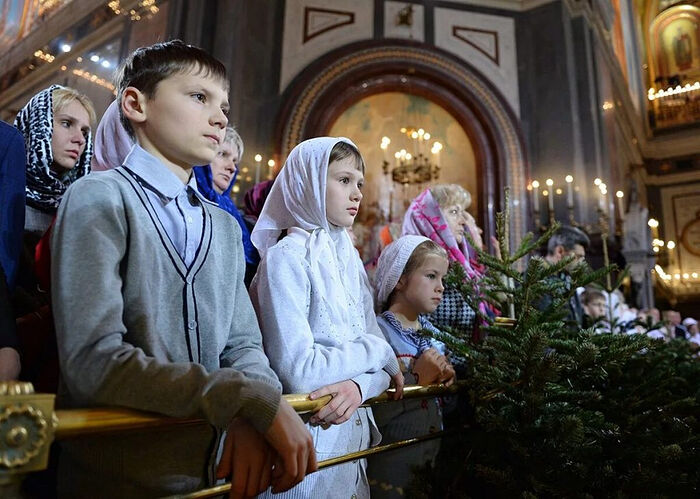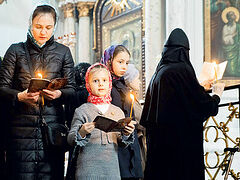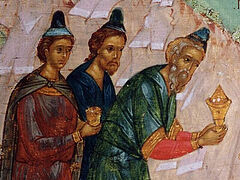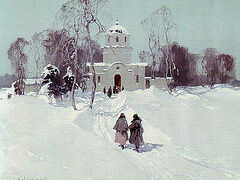The Nativity Fast is here. We are walking along the path of the forty days of awaiting the Birth of the Infant Jesus Christ—a joyful feast filled with the anticipation of a real miracle. But how can we combine the labor of fasting with the fact that you want to enjoy yourself during the New Year holidays, to go for walks with your friends and watch TV longer on New Year’s Eve? Igor Tikhonovsky, a specialist at the Moscow City Methodological Center of the Department of Education, a teacher at St. Tikhon’s Orthodox University of Humanities, and a father of five children, shares his family experience of walking along the path of the Nativity Fast with children.
—Igor Vladimirovich, the feast of the Nativity of Christ is particularly loved in Russia, primarily because it is associated with wonder, winter, snow and home comforts. And this festival is also special for children. It coincides with school holidays, with celebrations, with the Christmas tree and with everything that brings them a lot of positive emotions. But all this falls on the Nativity Fast. How can a child, on the one hand, be allowed to rejoice at the Birth of Jesus Christ, and, on the other hand, observe at least some ascetic rules and perform his modest spiritual labor?
—To begin with, the fast begins forty days before the Nativity. Naturally, a child will not have the desire to celebrate right away, because there is still a lot of time ahead. Any fast in the Church tradition prepares us for the feast. Why do we need fasts? In order to learn how to really enjoy the feasts. Imagine that every day is a feast. We celebrate for a whole week and at the end of the week we won’t even feel that this is a big feast. The Nativity Fast calls on us to reflect, to feel that there were some restrictions and finally we can celebrate together with the newborn Lord. It’s a joy for everyone.
When a woman is expecting a baby, she is often in pain and pangs, and when labor begins, it’s enough to drive you up the wall; but when she gives birth to a baby she feels happy. It’s about the same thing, when we are all “in labor.” The whole universe is anticipating childbirth. When the Mother of God was with child, She waited, too, and the whole world withdrew into itself. And we should explain to small children that this is a mystery. We can say to them: “Imagine that we are in a forest that we need to go through. It’s dark ahead, shadows are falling. We need to make our way along these secret paths, and the newborn Christ awaits us.”
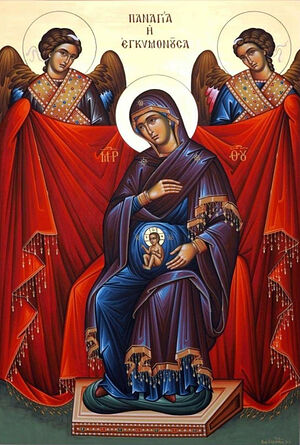 —How can we offer our children something new every time they go down this path? After all, they think that Christ was already born last year—why wait for Him again?
—How can we offer our children something new every time they go down this path? After all, they think that Christ was already born last year—why wait for Him again?
—God is eternal.
—Will a young child understand that?
—But his birthday is celebrated every year as well. According to that logic, we shouldn’t celebrate our birthdays either.
—So, should we provide some associations that are understandable to the child?
—Yes, associations directly related to his life and his experience. Every year the child looks forward to his birthday: it is very important for him. He waits for presents, celebrations and something new on this day. Likewise, the Nativity of the Lord Jesus Christ is not the same every year, because we get older, our children get older, they change, and their perception of this feast changes. The Nativity cannot be the same as it was a year ago.
—How should a young child spend these forty days before the Nativity? What should he focus on?
—With this fast we must await a miracle. There are always a lot of different movies and fairy tales at Christmas, and we all anticipate something magical and beautiful. As they say, whoever has never tasted what is bitter does not know what is sweet. We must restrict ourselves a little and prepare for this miracle.
Whenever we want to play a game, we have to learn its rules, especially if we want to win and get a prize. And these rules are often very complicated.
—Fasting is always associated with intensive spiritual labors and prayer. You suggest a different approach. But isn’t it also important for a child to work?
—You are right, and this game includes work.
—How can this be expressed in practice?
—These rules must be followed, and this is work too.
—Will we thus denegrate the prayerful and ascetic work, albeit modest, of a child?
—Our attitude should be this: In order to be with the Lord on this feast we should walk along this path together with Him. While we fast, the Lord is in the Virgin Mary’s womb—it’s not an easy period for Him. Let’s help Him together and walk along this path together!
—Of course, this requires a lot of attention to the fast from the parents’ side.
—That is always so. If parents do not fast, their children will not fast either. If fasting is not important for parents, then it will not be important for their children either.
—We should sit down and talk it over with our children in advance. We can’t just suddenly say: “Tomorrow the Nativity Fast begins—we won’t watch cartoons anymore and we’ll lead a strict life.”
—We must explain why we do this. We help the Infant Christ.
—What specific things would you recommend parents to do with young children during the Nativity Fast that they do not do during the Dormition Fast, the Apostles’ Fast and Lent?
—In my view, the Nativity Fast is a joyful one. During Lent we go together with Christ through His suffering, and now we await a miracle and joy. It would be good for parents and their young children to read about Christ in the evenings and talk on family topics. What has Western Christian culture come to? To Christmas without Christ! In order not to reduce the great feast to gifts from Santa Claus during the Nativity Fast we should talk about Christ, Who He is, What He is like and why He is now in the Virgin Mary’s womb. In such a warm family atmosphere the child should have a tender feeling for the little Christ.
—For the past thirty years we have been slowly getting rid of our Soviet past. But nevertheless, for many people the New Year is the most important holiday, and only then the Nativity. Clearly, it is also related to the calendar. But how can we switch the child’s attention from New Year’s celebrations to the main feast? Especially if the child goes to a public school and not an Orthodox one.
—It is very deeply ingrained in our society. No matter how you feel about it, you can’t lock your children up at home on New Year’s Eve and put them to bed, despite the fireworks booming outside. But actually, it shouldn’t be done. This is what we do: we celebrate the New Year by gathering around the table all together, and soon we go to bed. We don’t arrange a long party until the morning on this day. We can just go for a walk with our family in the evening, as on an ordinary weekend, nothing more.
—Do you exchange presents only on Christmas?
—At Christmas our children receive the main presents under the Christmas tree. Some souvenirs are prepared for the New Year too. And we prepare our children for this.
—So we do not exclude the New Year as such, because it is a wonderful holiday too.
—You are right, but we don’t turn it into great fun with setting off firecrackers or an excuse for the parents to drink alcohol. It’s just a family, home holiday. Everybody gathers around the table, celebrates for a while and goes to bed.
—I know that some priests’ families put up a Christmas tree closer to the Nativity (January 7), but there is no tree for the New Year in their homes. Should your child have a tree for the New Year?
—I don’t think it’s a problem if there’s already a Christmas tree on New Year’s Eve. It is clear that the Christmas tree is a symbol of the Nativity, and the New Year has nothing to do with it. The Christmas tree creates a special atmosphere, and children decorate it gradually. This is a very important educational moment. It should be pleasant and good for children to feel they are part of their family. Of course, each family has its own traditions, but I don’t see a problem here.
 —Schoolchildren’s New Year holidays, New Year parties and shows, carnivals fall on the final days preceding the Nativity celebrations. What do you think about this?
—Schoolchildren’s New Year holidays, New Year parties and shows, carnivals fall on the final days preceding the Nativity celebrations. What do you think about this?
—My attitude is negative.
—If your teenage child is invited to a party, would you let him go?
— No. There are certain limits to celebrations. And there shouldn’t be any parties. We are Christians above all. It is sad when there is no understanding in Government structures that holidays should be after Christmas, and not before it.
—And how can you avoid a conflict with your child if he asks you to let him go to a party? Especially if he’s a teenager and puts his companions first. He has friends, or his first love, and his father or mother forbids him to join his friends.
—That’s not quite true. If a child grows in a Christian family, he already understands that he shouldn’t ask—it’s pointless, especially in the final days before the Nativity. We’ve had such situations in our family.
—And how did you get out around them? Was your child offended that you didn’t let him go?
—He probably was.
—This is despite the fact that children know what kind of holiday it is and you are in permanent contact with them. But they ask anyway, because they are children and popular opinion around them differs.
—Of course, I try to talk over these moments with them calmly. They can turn away and keep silent for a while. But in any case, I explain that first of all we are Orthodox Christians and our family puts the Lord first, and then everything else. There’s nothing to be offended about. If you limit children strictly during the fast, this is one situation—then they can explode during these days. But if you only slightly limit them throughout the fast, they won’t explode, because you give them many relaxations during the fast. But not right before the Nativity! Earlier, before the New Year—yes, but not later.
—So, there is silence from January 1 to 7?
—Of course.
—Are there any food restrictions in your family during the Nativity Fast?
—We usually abstain from meat and replace it with fish. Of course, we keep dairy products. Sweets are limited significantly, but not excluded completely. Discipline is important in everything, including in spiritual life and in the Church. Children know that such a period will come now and it will be so. They don’t ask why something will change, because from year to year everything happens the same way. This is how a family tradition is developed. There is no desire to go to any parties at this period, because that’s the way it is in your family. I call on all Christian families to develop these traditions. When there is constancy in life for a teenager, he will know that it happens this way and no other way.
—As for restrictions on gadgets, movies and other entertaining content, it is quite hard to control it. If a child has a cellphone in his hands, he will not watch only the cartoons that are beneficial to his soul.
—He certainly won’t. But there are screen time limits for cellphones. I have this application on all our children’s phones. Phones are blocked at a certain time of the day. They use their cellphones to log into the app at school and do their homework. Each child has a time-table on his phone. During the fast, the time for gadgets is limited. Our eldest daughter turned fourteen on November 7, and she wants us to stop controlling her time on the phone. The other children take it easy, because this is a permanent measure. At first, they resisted. Now none ever thinks that it can be otherwise.
—You seem to be a model Christian family. Unfortunately, there are not many such families.
—There are certain tools, all this can be introduced, and we all live in similar conditions. The most important thing is discipline. When I come home from work, my children are having dinner, and I can ask them, “Did you make the sign of the cross?” I remind them, but in no way force them or impose anything on them. And the children slowly begin to understand that we should at least make the sign of the cross before eating if we don’t read a prayer.
—Now the question of children’s participation in the Christmas Liturgy. Many churches have night services. What do you think about this? Should children attend it? If a child is small and his mother wants to pray at the service, should she take him with her? Will the mother be able to pray then, or will she be distracted all the time?
—As one priest said, parents with young children do not come to pray, but come to integrate their children into Church life. There is no question of a mother with her young child attending a night service at all. Until the age of five it can only be a morning service. If you really want to go to a night service, you need to accept the fact that now it’s impossible.
—From what age should a child be in the church at night?
—Ideally, I think that a child can go to church for a night service from the age of ten.
—The feast is over, and we have to return to normal life. You were happy, you looked forward to it, but now it is over. It seems to me that not only children, but even adults sometimes feel sad because of this. How can children get through this? They want to go on. Moreover, while their classmates were having fun and enjoying themselves on New Year’s holidays, they were fasting.
—After any high point we go back to normal. Let the children not go to school for two or three days after the feast, because it’s Christmastide; these are holy days and nothing bad will happen in three days. I address parents who are worried about lessons and studies: Don’t worry—everything will be fine. Nothing will happen at school, but the Christmas season will end. The most important thing is the salvation of the soul, not lessons and grades. The Lord will not ask us about our grades at the Last Judgment. He will ask how you lived, what you felt, how you acted. It is necessary for us, parents, to understand and not to put pressure on our children. Children come to school to get knowledge, not grades. Should we take the teacher’s grades as the ultimate truth? No!
—We prepared and read interesting books related to the Nativity. Should there be a continuation of the festivity?
—Of course, you can go to Christmas parties and shows, watch Sunday dramas in the church, attend open-air festival events, slide down icy hills, etc. This is vital. Otherwise, there will be no joy from this feast later, and then there may be no joy from Christianity altogether.

